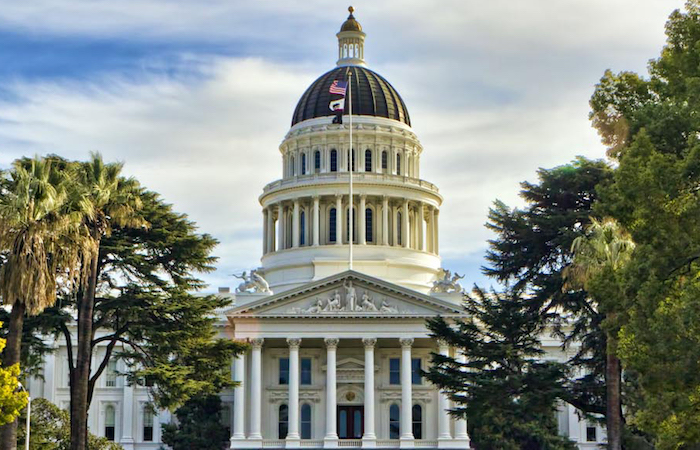CBPA's California Legislative Update 3/29/19

- SENATE DISTRICT 1 WILL SEE TWO INCUMBENTS BATTLE
- INDUSTRYWIDE LEGISLATIVE MEETING!
- ACTION! CARRIED INTEREST TAX RATE INCREASE
- REAL ESTATE BROKERAGE FIRMS – USE OF LLC
- INDUSTRY SUPPORTS DISTRIBUTED ENERGY BILL
- PLEASE TAKE THE ARB CHARGING STATION SURVEY
- CALIFORNIA ENERGY AMONG MOST EXPENSIVE
- TRADE GROUP WINS FIRST BATTLE AGAINST CA LABOR LAW
- 2020 SPLIT ROLL MEASURE MUST BE DEFEATED
- CBPA 2019 CALENDAR
SENATE DISTRICT 1 WILL SEE TWO INCUMBENTS BATTLE
The power of incumbency, large war chests of money, and too little time, were just too much for Rex Hime to overcome in his bid to fill the vacancy for Senate District 1. On Tuesday in the Special Election Primary, he placed behind his two Republican rivals who took the top two slots and will go on to battle in the General Election.
Rex stated, “I want to thank all of you for your support. I always say, “if you are not at the table, you are on the menu.’ I stepped-up and tried to get a seat for our industry to be better represented in the Legislature. It was not meant to be. I look forward to continuing my work on your behalf from CBPA and leading the fight in the battle against Split Roll Tax.”
On behalf of our industry, thank you Rex for putting yourself out there and giving it a shot. The Legislature could use someone like him and our industry needs more individuals there that understand the commercial real estate industry.
Assemblymembers Dahle and Kiley will vie for the seat this June in the General Special Election. This will trigger another special election to fill whichever one of their seats are vacated.
INDUSTRYWIDE LEGISLATIVE MEETING!
Yesterday in a well-lit room in Irvine, CA, twenty leaders/experts from the commercial real estate industry gathered to review more than 500 pieces of legislative that potentially has an impact on your business.
This year, legislators have introduced over 2,600 bills since January, and all of them have been reviewed and analyzed by multiple committees of experts representing owners and/or managers of retail, industrial, office, and mixed-use properties; we also had several lawyer’s expert in environmental law, leasing and escrow, and energy. Together positions were discussed and adopted so set the direction for the representatives of commercial real estate in Sacramento.
This year, measures on property taxes, trauma kits, energy efficiency and seismic issues of new and existing buildings, electric vehicle charging stations, solar and photovoltaic policy, water conservations, CEQA, and over 200 bills aimed at the housing crisis, were all reviewed.
Please help us thank everyone that give back to the industry by providing analysis and discussion on bills that have the potential to impact our bottom line.
ACTION! CARRIED INTEREST TAX RATE INCREASE
Our friends at ICSC have alerted us that early next week the tax writing committee in the U.S. House may be voting on legislation to increase the tax rate on carried interest from the capital gains rate to the ordinary income rate. ICSC has provided the following information and way for you to register your concerns:
Register your opposition to a carried interest tax increase here.
H.R. 1735, the Carried Interest Fairness Act, currently has 21 Democratic cosponsors. ICSC has learned that the bill is being discussed as a way to pay for other tax changes the Committee wants to make. Our challenge is to educate Congress that a carried interest tax increase is a real estate issue, not a Wall Street issue.
In this Congress there are many new members now on the W&M Committee that are unfamiliar with the carried interest issue and its implications. The real estate community believes that most of the $14 billion revenue estimate for a carried interest rate hike is attributable to our industry.
Republicans need to hold firmly off the bill or an increase; Democrats need to know the consequences -- time is of the essence!
REAL ESTATE BROKERAGE FIRMS – USE OF LLC
On behalf of the commercial real estate industry we California Business Properties is pleased to be working with Assemblymember Tom Daly (D-Anaheim) on AB 687 a bill to allow limited liability companies (LLC) to operate as a real estate broker.
Real estate broker licensing was not extended to LLCs when other types of licensing were extended to LLCs because at that time our industry standard was to operate as corporations and partnerships and our members had little or no familiarity or experience with LLCs. Over time that has shifted and now many companies within the real estate industry use LLCs extensively to hold and operate real property. AB 687 updates the statute to reflect that evolution in the industry.
Enabling brokerage firms to form as an LLC will allow greater flexibility in management and operations which will be particularly helpful for smaller firms and those with an in-house broker. This comports with the less formal operations of smaller businesses. AB 687 also will enable a savings of both time and costs for these firms as operating as an LLC means more streamlined entity reporting and filing requirements than a corporation.
Finally, AB 687 will simplify taxation at the entity level as gains and losses are passed through and taxation occurs at the individual owner level. Although Subchapter S corporations do offer the same income tax pass-through feature, limitations on number and types of owners and other restrictions make the Subchapter S vehicle less readily available.
Under AB 687, LLCs would not receive any favored treatment (over corporations) as to broker licensing. LLC licensees would have the same filing requirements as corporate licensees with respect to licensing; LLC licensees would have the same insurance requirements as corporate licensees; and LLCs would pay property taxes on real property owned at the same rates and using the same valuation principles applicable to corporate real estate owners.
We will keep you posted on AB 687’s progress and thank Assemblymember Daly for working with us on this measure.
INDUSTRY SUPPORTS DISTRIBUTED ENERGY BILL
SB 288 (Wiener; D-San Francisco) a measure designed to reduce barriers to the deployment of distributed energy resources by addressing needed changes in utility tariffs and reducing interconnection challenges. This bill is dubbed the Solar Bill of Rights.
SB 288 would ensure that California businesses and homeowners are able to make, store and use clean energy on their property without undue interference from the utility; connect clean energy technologies to the grid in a quick and efficient manner; be free from inequitable fees and charges associated with installing onsite clean energy technologies; and increase the reliability and resiliency of the state’s electric grid.
As wildfires and other climate-related challenges become more frequent and destructive, California must build a power grid that is more reliable, resilient and safe. By reducing climate pollution, increasing the state’s reliance on distributed energy resources, and giving customers a way to keep the lights on when the grid goes down, local solar, batteries, and other smart clean energy technologies are an important piece of a cleaner and more reliable energy future.
PLEASE TAKE THE ARB CHARGING STATION SURVEY
The California Air Resources Board (CARB) is tasked with leading the state’s effort to reduce carbon emissions. Many strategies are being employed but one that impacts our industry the most is increased energy efficiency through the state building code.
CARB is collecting anonymous data to measure the conversion rate of electric vehicle (EV) Capable spaces to EV charging spaces in new commercial buildings in California. EV Capable spaces are parking spaces that include basic EV charging infrastructure including raceway (enclosed conduit) and panel capacity to accommodate future installation of a Level 2 EV charger.
CARB staff are also trying to better understand any barriers encountered with the installation of Level 2 EV chargers. Results of this survey will be used to inform development of the California Green Building Standards (CALGreen) Code.
The questionnaire will take about five minutes to complete. This survey is anonymous, and you have until April 12, 2019:
Nonresidential Developer Survey of Electric Vehicle (EV) Charger Installations
Multifamily Developer Survey of Electric Vehicle (EV) Charger Installations
Please take the time to complete this survey. The results will inform future requirements on your properties!
CALIFORNIA ENERGY AMONG MOST EXPENSIVE
The annual U.S. electricity price map released by the U.S. Chamber of Commerce Global Energy Institute shows California average electricity retail prices are among the highest in the nation.
The map uses the most recent full year of data available from the U.S. Energy Information Administration, Electric Power Monthly (February 2019).
The national average price is 10.58 cents per kilowatt-hour (kWh). The average price in California is 16.7 cents per kWh, seventh highest in the nation, according to the U.S. Energy Information Administration data.
Click here to see the map.
TRADE GROUP WINS FIRST BATTLE AGAINST CA LABOR LAW
A state judge handed the California Business & Industrial Alliance (CABIA) its first win Thursday when he denied Attorney General Xavier Becerra’s attempt to dismiss a landmark case challenging a state law that empowers private citizens to file labor lawsuits.
Orange County Superior Court Judge Peter Wilson found in a tentative ruling he confirmed in court Thursday afternoon the California Business & Industrial Alliance has standing to bring claims on behalf of its business-owner members challenging the constitutionality of the Private Attorneys General Act, a state law that deputizes workers to bring claims against employers believed to be violating state labor laws.
The decision comes after the California Industrial & Business Alliance brought its lawsuit challenging PAGA last year claiming the law, as applied, has been abused by attorneys filing thousands of lawsuits on behalf of workers for their own private gain.
California enacted PAGA in 2004 when the state was in the throes of a budget – and staffing – crisis in the hopes that private citizens who filed lawsuits for labor code violations could help the state bring offenders to justice
Click here for more on this story and to learn how you can support CABIA’s efforts.
2020 SPLIT ROLL MEASURE MUST BE DEFEATED
Proposition 13 has been protecting taxpayers in California since 1978. This measure created by Howard Jarvis is one of the only protections that you have against unimpeded increased in your property taxes – and now it is under serious threat.
Californians are some of the most heavily tax-burdened in the country. Now, special interests want to raise taxes by another $11 billion through this measure, despite record-high revenue, record-high per-pupil spending and $17 billion in budget reserves. A split roll property tax increase isn’t needed and will just make it more difficult to do business in California.
For years public employee unions and far-left wing advocacy groups have wanted to dismantle Proposition 13 in hopes of increasing your taxes to increase revenue for their members and pet spending projects. Those groups have gathered enough signatures to place a measure on the ballot in November 2020.
One of the ONLY protections property owners in this state has is under serious threat and for thirty years – and now -- I remain one of the primary people standing to fight back against this outrageous tax increase.
Under the 2020 proposal, Prop. 13 will be undone by mandating that all non-residential properties be reassessed to 2020 values and be reassessed every three years thereafter. Commercial property will lose certainty about future tax liabilities and one can only imagine the impact and cost to long time property owners that will see massive adjustments.
The proponents of this effort have stated that dismantling Prop 13 will result in an $11 billion tax increase on California’s property owners and employers.
Aside from the direct impact on properties, the State’s own Legislative Analyst’s office has warned that the proposal will introduce volatility into the state’s funding stream that puts everything from school funding to support and health programs for the elderly at risk.
Property taxes have been a reliably predictable revenue source for the state since prop 13 passed which allows for some predictability in budgeting and a reliable revenue stream. The greediness of those that want to transfer property tax revenue to their own pockets threatens a system that has worked for more than 40 years!
As one of the longest standing taxpayer advocates in the state, I am coordinating an effort by taxpayer advocates and business groups alike to implement a statewide strategy and defeat this measure. The campaign will be very costly and will take the efforts of many, but the costs of this tax are much greater. Split roll inflicts a mortal wound on Prop 13 protections for all property owners and must be stopped.
Rex S. Hime has been protecting CA taxpayers his entire career. He has served as the President & CEO of California Business Properties Association for 35 years.
CBPA 2019 CALENDAR
June 11 – 12, 2019
California Commercial Real Estate Summit
Sacramento
December 5 – 6, 2019
Strategic Issues Conference
Napa Valley






































